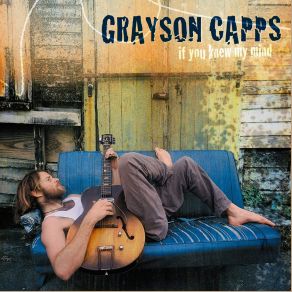If You Knew My Mind
Download links and information about If You Knew My Mind by Grayson Capps. This album was released in 2005 and it belongs to Rock, Blues Rock, World Music, Songwriter/Lyricist, Folk genres. It contains 12 tracks with total duration of 46:11 minutes.

|
|
|---|---|
| Artist: | Grayson Capps |
| Release date: | 2005 |
| Genre: | Rock, Blues Rock, World Music, Songwriter/Lyricist, Folk |
| Tracks: | 12 |
| Duration: | 46:11 |
| Buy it NOW at: | |
| Buy on iTunes $9.99 | |
| Buy on Amazon $9.49 | |
Tracks
[Edit]| No. | Title | Length |
|---|---|---|
| 1. | Get Back Up | 4:03 |
| 2. | If You Knew My Mind | 3:03 |
| 3. | Slidell | 3:54 |
| 4. | I Can't Hear You | 3:38 |
| 5. | A Love Song for Bobby Long | 4:53 |
| 6. | Graveyard | 4:00 |
| 7. | Mercy | 3:42 |
| 8. | Lorraine's Song | 4:06 |
| 9. | Washboard Lisa | 3:36 |
| 10. | Buckshot | 3:51 |
| 11. | How's I to Know | 3:23 |
| 12. | I See You | 4:02 |
Details
[Edit]It takes less than 30 seconds for the debut album from this New Orleans-based singer/songwriter to pull you in. A lone harmonica blows over a softly strummed electric guitar as a lazy rhythm section props up the beat. Grayson Capps' weathered voice then enters: "Yesterday was a very fine day indeed, I got a pint of beer, went outside and brushed my teeth." That about sums up this impressive yet unassuming bluesy debut from one of the many musicians who sound like what New Orleans feels like: languid, a little grimy and dangerous, but with a sense of history and self that wafts up from the streets. Those who listened closely to the soundtrack of the movie A Love Song for Bobby Long will recognize Capps, as his music was used to excellent effect in that rather obscure flick. In fact, "Lorraine's Song," the most recognizable tune on that soundtrack, is a Capps composition and gets a suitably impressive and subtle performance here, as does the song whose title inspired the movie. He has a way with a drowsy melody, and after a few spins, these tracks gradually take hold. Certainly anyone who has explored the back streets of New Orleans will recognize the downtrodden characters who populate this album. Capps mythologizes their misery and sadness in songs that are heartfelt and edgy, but he never shortchanges melodies in exchange for gritty, often poetic lyrics. Guitar solos, such as the one in the Crazy Horse-styled "Buckshot," are short, tight, and succinct, just like the band that ably supports Capps. His voice sounds like he just woke up and started singing before his first cup of coffee, but that adds to the effect. The album loses a little steam as it winds down, yet this is still a stirring first effort. It conveys the sense, sounds, and dark allure of New Orleans and many of its residents more effectively than a stroll through the French Quarter.